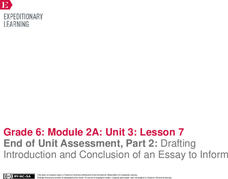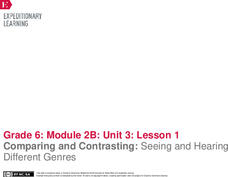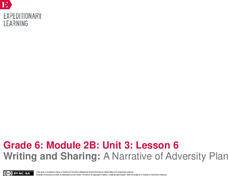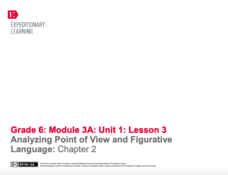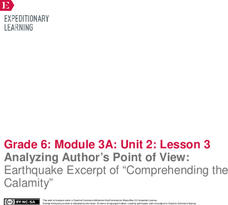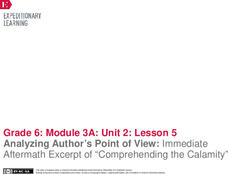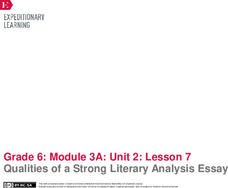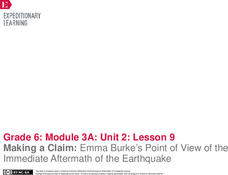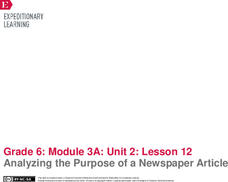EngageNY
End of Unit Assessment, Part 2: Drafting Introduction and Conclusion of an Essay to Inform
A powerful introduction and conclusion can really pack a punch. Using the resource, scholars first read and discuss a model essay. Then, as part of the end of unit assessment, they draft the introductory and concluding paragraphs of...
EngageNY
Comparing and Contrasting: Seeing and Hearing Different Genres
Let's compare and contrast! Scholars use a Venn diagram to compare and contrast the experience of reading a poem and listening to its audio version. Next, they complete graphic organizers, comparing two different genres: a poem and a...
EngageNY
Mid-Unit Assessment: Small Group Discussion: How Do Modern Poems Portray Modern Adversities?
How is a poem similar to and different from a news article? Pupils use a graphic organizer to compare and contrast the two genres. Also, as part of a mid-unit assessment, scholars participate in small-group discussions based on poetry...
EngageNY
Writing and Sharing: A Narrative of Adversity Plan
When life brings you lemons .. write about it! Scholars work with partners to complete graphic organizers analyzing two narratives. Next, they develop an outline for their narrative writing assignment about a personal experience with...
EngageNY
End of Unit Assessment, Part 2: Drafting Introduction and Conclusion of a Narrative
First and last impressions matter. Scholars compose the introductory and concluding sections of their narrative writing assignments. Also, to prepare for an upcoming performance task, pupils watch a modern-day monologue from the movie...
EngageNY
Writing the Final Narrative: Monologue or Concrete Poem
Get inspired to help those creative juices flow. Using the resource, scholars write their final, best version of their narrative monologues or concrete poems. Next, they prepare for a performance task by watching and discussing a video...
EngageNY
Drafting Body Paragraphs
That's just the style. Learners begin with a mini-lesson about formal writing style. They then use what they learned about formal writing to begin the body paragraphs for their End of Unit 1 Assessment Prompt: Adversity in the Middle...
EngageNY
Performance Task Preparation: Peer Critique and Mini-Lesson Addressing Common Errors: Revising Draft Essay to Inform
Time to revise! Using a writing evaluation rubric, scholars participate in a peer editing process to provide feedback on each others' informative essays. Next, pupils begin revising their drafts based on the feedback they receive.
EngageNY
Analyzing Point of View and Figurative Language: Chapter 2
Just get to the gist. Scholars work in pairs to find the gist of an excerpt from Laurence Yep's Dragonwings. Pupils also complete graphic organizers to analyze the text for tone, point of view, and figurative language.
EngageNY
Analyzing Point of View and Figurative Language: Chapter 3
Get to the point ... the point of view, that is! Pupils analyze Laurence Yep's Dragonwings for tone, figurative language, and point of view by completing graphic organizers. Scholars also read an excerpt from the novel and record the...
EngageNY
Introducing The Lost Garden and Finding Evidence of Laurence Yep’s Perspective on What It’s like to Fit into Another Culture on Pages 66– 67 of Dragonwings
How does culture shape perspective? Pupils consider the question as they read an excerpt from Laurence Yep's autobiography, The Lost Garden. Using a graphic organizer, they gather textual evidence and make inferences about the author's...
EngageNY
Introducing “Comprehending the Calamity”
Some things are beyond comprehension. Scholars read an excerpt from "Comprehending the Calamity," a primary source text about the 1906 San Francisco earthquake. After identifying the gist, pupils complete anchor charts to analyze how the...
EngageNY
Analyzing Author’s Point of View: Earthquake Excerpt of “Comprehending the Calamity”
How do authors convey their points of view? Using the resource, scholars read an excerpt from a primary source document about the 1906 San Francisco earthquake. Then, they complete graphic organizers to analyze the author's point of view.
EngageNY
Finding the Gist of the Immediate Aftermath: Excerpt of “Comprehending the Calamity”
Brace for the aftershocks! Scholars read an excerpt from a primary source document about the immediate aftermath of the 1906 San Francisco fire and earthquake. Next, pupils complete an anchor chart, analyzing how the author introduces,...
EngageNY
Analyzing Author’s Point of View: Immediate Aftermath Excerpt of “Comprehending the Calamity"
Analyze that! Scholars continue reading and analyzing a primary source about the immediate aftermath of the 1906 San Francisco fire and earthquake. Then, individuals use graphic organizers to identify the author's point of view.
EngageNY
Qualities of a Strong Literary Analysis Essay
Read like a writer. Scholars read a model literary analysis in preparation for a similar writing assignment before annotating each paragraph for the gist. Next, pupils devise a list of qualities of a strong literary analysis essay.
EngageNY
Reading for Gist and Analyzing Point of View: Moon Shadow
Character analysis isn't always earth-shattering. Using a graphic organizer, pupils analyze Moon Shadow's point of view following the earthquake in Laurence Yep's Dragonwings. Also, scholars co-create an anchor chart showing the...
EngageNY
Making a Claim: Emma Burke’s Point of View of the Immediate Aftermath of the Earthquake
Sharpen those pencils; it's time to write! Scholars begin writing the first body paragraph of their literary analysis essays. Additionally, pupils use graphic organizers to analyze a character's point of view from Laurence Yep's...
EngageNY
Analyzing the Purpose of a Newspaper Article
Shh! No talking during the discussion! Using the resource, scholars engage in a silent discussion called a Chalk Talk activity to analyze the purpose of a newspaper article. Additionally, they read a model newspaper article and try to...
EngageNY
End of Unit 2 Assessment: Final Literary Analysis
Get ready to review and revise! Scholars peer edit each other's literary analysis essay drafts. Next, using peer and teacher feedback, pupils compose their final drafts.
University of Colorado
Enceladus, I Barely Knew You
Use spectral knowledge to make discoveries on a distant moon. Small groups gather information from images of one of Saturn's moons. The moon orbits within the E-ring made up of mainly water ice. Using information about the composition of...
EngageNY
Researching Information about Sustainable Fishing
Go fish! Scholars continue using their research skills to find factual information to use in their consumer brochures about overfishing. They work in triads to research information about sustainable fishing practices and share their...
EngageNY
Researching Information about Overfishing
Imagine a world without Nemo and Dory. Using the resource, pupils engage in a jigsaw activity, working in triads to research information about overfishing. They watch a video about overfishing, complete a graphic organizer, read relevant...
EngageNY
Completing Reflection: Preparing a Poster for Presentation
Prewrite, plan, draft, revise, edit, share. Scholars complete a worksheet to reflect on how they used the writing process to improve their writing. They also draft plans for their scientific posters that they will display in an upcoming...
Other popular searches
- Differential Equations
- Differential Rotation
- Differential Heating
- Differential Calculus
- Differential Correction
- Differential Leveling
- Math Differential Equations
- Differential Operators
- Differential Instruction
- Calculus Differentials
- Differential Extrema
- Differential Aptitude


